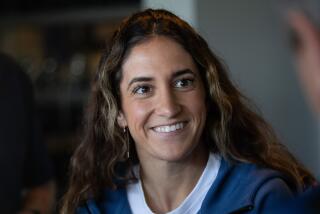A.E. De Mello; Father Pushed Son to Get a College Degree at Age 11
- Share via
Augustin Eastwood De Mello, the controversial father who pushed his son to become the nation’s youngest university graduate at age 11, has died. He was believed to be 73, although his birth date also has been listed as Oct. 15, 1939, making him 63.
De Mello died of bladder cancer Friday in a Santa Clara nursing home.
A self-declared genius, De Mello worked as a technical writer. He wrote boxes of poetry and self-published some. He played flamenco guitar Saturday nights at the Whole Enchilada restaurant and bar in Moss Landing, Calif.
He collected trophies for excelling at boxing, weightlifting, karate, rifle shooting and chess.
But De Mello was unquestionably best known for his efforts to make his son famous as a nationally publicized “genius” and the youngest to earn a bachelor’s degree in America, winning a place in the Guinness Book of World Records.
Adragon “A.D.” De Mello, now 26, achieved his father’s goal in 1988, when he graduated from UC Santa Cruz with a degree in computational mathematics. He was accepted into a graduate program at the Florida Institute of Technology.
The boy was 11 -- and was soon sent back to junior high school by his mother to retrieve some normalcy. He now lives with his mother, Cathy Gunn, in Sunnyvale, and works for Home Depot while he decides how to spend his life.
“I don’t necessarily agree with a lot of those things he did in raising me,” Adragon De Mello told the San Jose Mercury News after his father’s death. “But I know he did it because he cared. Even up until the end, he told me how proud he was of me. I hope I can do the same for my kids.”
A few months after the boy’s graduation, Gunn sued De Mello -- whom she never married but had lived with in Los Angeles and elsewhere -- for custody, accusing him of forming a “suicide pact” with their son. Ten guns and suitcases of ammunition were found in De Mello’s home, and he was forced to undergo psychiatric evaluation. He was also arrested on suspicion of felony child endangerment, although prosecutors later declined to file formal charges.
“Nothing I’ve done creatively can compare to creating my son. Nothing comes close,” De Mello told The Times shortly after his release. “So, as far as accusations about a suicide pact: ridiculous. I don’t know of anyone who would destroy their greatest creation.”
Augustin De Mello boasted that his son was “the most intelligent child so far found in this world.” Critics contended that the father was obsessed with making his son famous and pushed him beyond his capabilities.
Given to histrionics, especially when confronting his son’s teachers, De Mello twice had run-ins with law enforcement after the custody battle -- in 2001, when he called 911 but refused to admit responding Santa Cruz police officers and instead allegedly fired a gun at the door; and in 2002, in a road-rage incident. Because of his declining health, he was given probation in the first incident and did not stand trial in the second.
Although De Mello delighted in telling the news media about the remarkable achievements of his son -- little “A.D.” said “hello” when he was 7 weeks old, and at 3 announced the scientific theory that “electric chemicals make boys” -- he disliked talking about his own past.
He claimed to be a distant relative of actor Clint Eastwood, and said he lived briefly with his grandparents “on the East Coast” after his parents separated when he was a child. He said he also grew up in orphanages and began doubting the American educational system when he was in first grade.
He told The Times that he got a master’s in physics and astronomy from Metropolitan Collegiate Institute of London and a doctorate in theoretical astrophysics from Ohio Christian University. Then he took the high school equivalency and SAT test, and in 1974 earned a bachelor’s degree in English at UCLA.
With the exception of UCLA, “Bear’s Guide to Non-Traditional College Degrees” calls his alma maters “degree mills.”
De Mello became a member of Mensa, the society for people with high IQs.
He performed in Greenwich Village bars in New York, along with a friend, beat poet Hugh Romney, who would later become famous as Wavy Gravy.
Romney in 1988 described the young De Mello for The Times as “a character in a sea of characters.”
When his son was born, De Mello devoted himself to putting the boy into the Guinness Book of World Records as America’s youngest university graduate -- which he achieved -- and making him a Nobel Prize winner by 16 -- which he did not.
De Mello drilled the child in square and cube roots at age 3, got him admitted into Mensa at 5 and enrolled him in Cabrillo Junior College at 8, from which he graduated at 10.
De Mello also put his son on the “The Tonight Show,” “60 Minutes” and other national television programs -- where the family became the focus of a debate about pushing children quickly through the educational system, costing them a normal childhood.
After the custody fight resulted in Adragon going to live with his mother, the son and father were estranged for several years.
But they resumed visits in 1996 and were close as the elder De Mello’s illness progressed.
De Mello is survived by Adragon of Sunnyvale and another son, Brad Farha of West Virginia.
More to Read
Sign up for Essential California
The most important California stories and recommendations in your inbox every morning.
You may occasionally receive promotional content from the Los Angeles Times.













